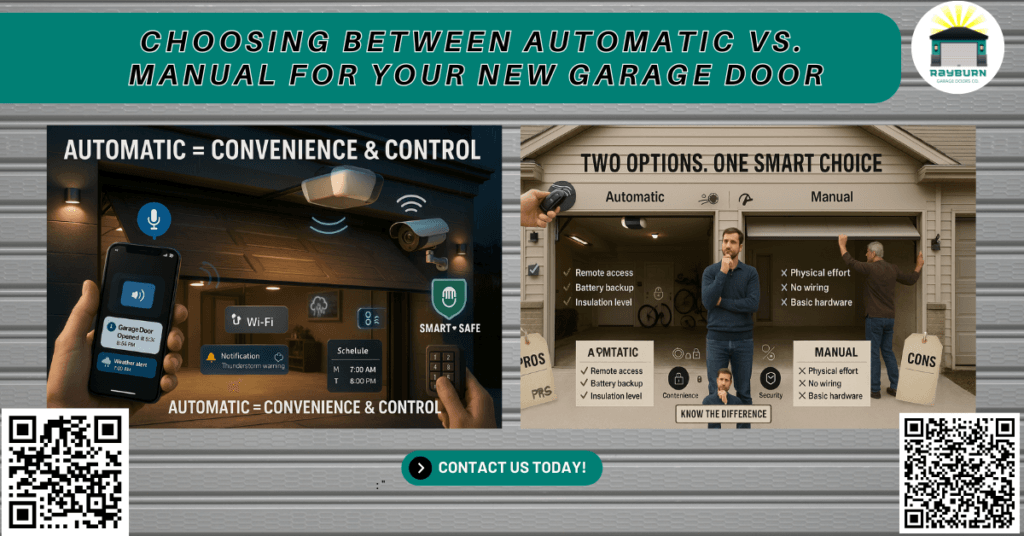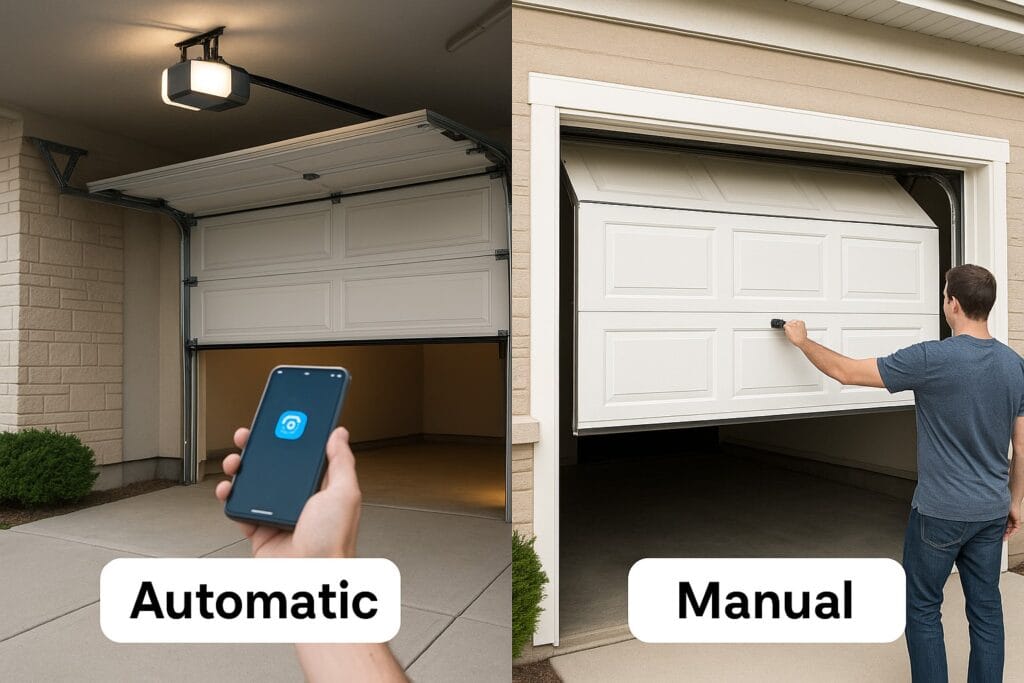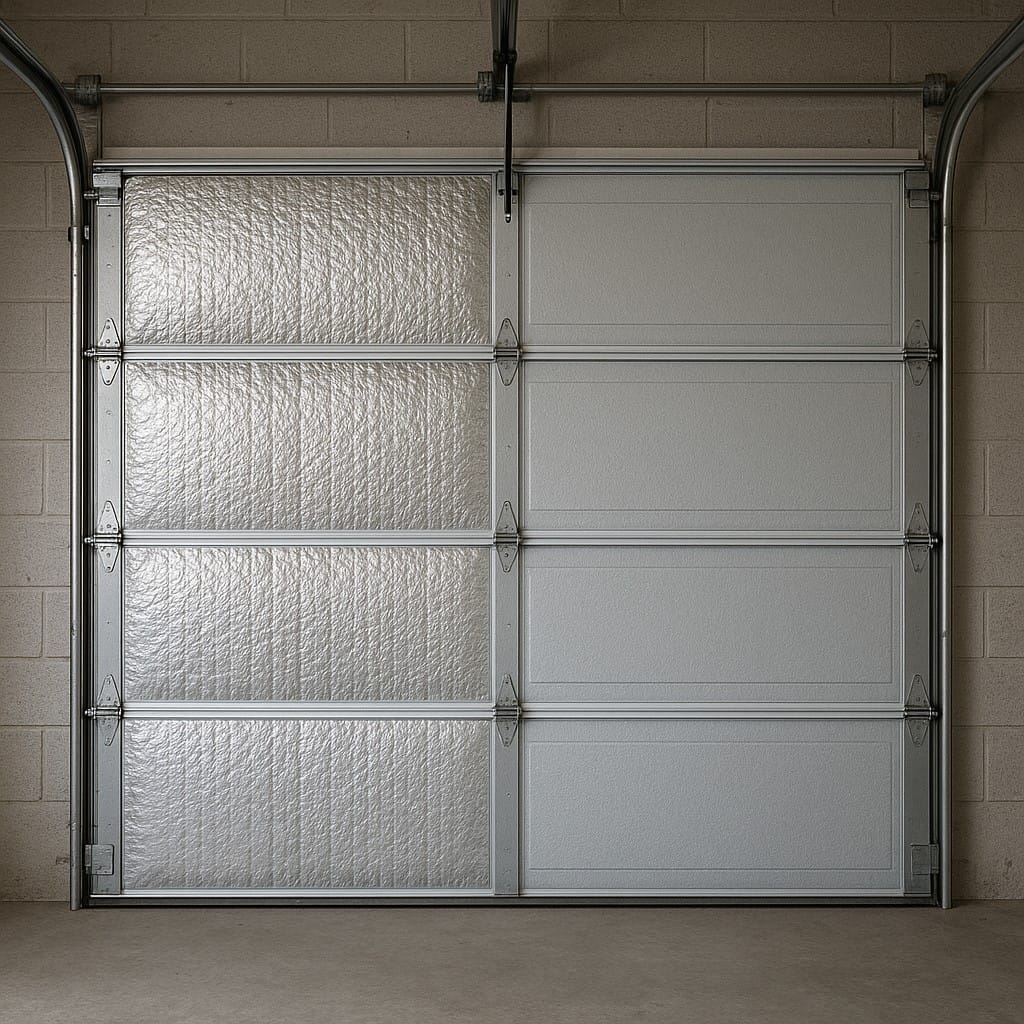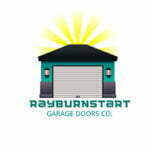Choosing Between Automatic vs. Manual for Your New Garage Door

Imagine this: a family in Plano, TX, recently decided to invest in a complete exterior makeover of their home. With fresh paint and landscaping completed, their next step was replacing their old garage door. They faced a decision many homeowners encounter: should they choose an automatic or manual operation for their new garage door? After consulting with our expert team at Rayburn Garage Doors Co, we helped them evaluate the cost, installation complexity, features, and long-term benefits of each type.
Did you know that nearly 70% of American homes today use automatic garage doors? The trend leans heavily towards automation due to added convenience, security features, and integration with smart technology. However, manual garage doors are still a solid option for certain door styles, materials, and applications, especially in detached garages or secondary structures.
At Rayburn Garage Doors Co., we specialize in guiding clients through every step of the garage door selection process. Whether you’re a first-time homeowner or looking for a garage door replacement, this guide will help you understand the differences, advantages, costs, and practical uses of both automatic and manual garage doors. Let’s dive into a detailed, informative comparison that covers every aspect of this important home improvement decision.
Understanding Garage Door Types
What Is an Automatic Garage Door?
An automatic garage door opens and closes with the help of a garage door opener that uses electric motors and a transmission system such as a belt drive, chain drive, or screw drive. These systems are often integrated with smart features, allowing control via remotes, smartphones, and even voice assistants like Amazon Alexa or Google Home. With built-in safety features such as motion sensors and emergency release mechanisms, automatic garage doors are designed to provide convenience and reduce the risk of injury.
This type of garage door is often selected for residential garages, attached garages, and modern homes that emphasize comfort and technology integration. They are compatible with various garage door materials, including steel, aluminum, wood, and fiberglass, and come in styles ranging from sectional garage doors to carriage house designs. Many homeowners appreciate the added insulation and noise-reduction features, which are especially beneficial for garages that are attached to living spaces.
What Is a Manual Garage Door?
A manual garage door, on the other hand, requires physical effort to open and close. These doors are generally lighter, often made of aluminum, vinyl, or uninsulated steel, and use torsion springs or extension springs to balance the door’s weight. Though they lack the convenience of an automatic opener, they have fewer parts that could malfunction, which means lower maintenance costs and increased reliability over time.
Manual doors are best suited for detached garages, workshops, storage units, or homes where budget constraints are a key concern. While they don’t offer the high-end smart features of their automatic counterparts, they are easier to install, operate during power outages, and offer an excellent return on investment in certain use cases. Some homeowners prefer the tactile reliability and simplicity, particularly in areas prone to power outages or in homes with multiple auxiliary buildings.

Comparing Key Features
1. Convenience
When it comes to daily usability, automatic garage doors lead the way. Simply press a button or use a smartphone app to open or close the door without leaving your car. This is particularly valuable during bad weather or nighttime. Modern garage door openers also offer Wi-Fi connectivity, battery backup systems, and remote access for deliveries or visitors.
Manual doors, although simple, require physical lifting and can be inconvenient for people with limited mobility or when carrying groceries or children. Additionally, if your garage door is large or constructed from heavy materials like solid wood, opening it manually may require significant effort. The ease of use that automatic systems provide makes them a popular choice among homeowners seeking comfort and practicality.
2. Cost and Installation
Manual garage doors are typically less expensive to purchase and install. With fewer moving parts and no motor, they involve lower labor costs and installation complexity. Depending on the material and style, manual doors can be installed in less than a day, making them a quick and affordable option. They also tend to have fewer future costs related to repair and electrical component replacement.
On the flip side, automatic garage doors have higher installation costs due to the opener, wiring, and often additional features such as keypads, security cameras, or smart sensors. These enhancements increase the overall value and usability of your garage, making it a good long-term investment despite the initial price. Homeowners should also factor in the ongoing costs of electricity and occasional maintenance when budgeting for automatic doors.
3. Safety and Security
Safety is a critical factor, especially for families with children or elderly members. Automatic doors include infrared sensors, auto-reverse systems, and emergency release cords, reducing the risk of accidents. Integrated security systems with rolling codes and alerts protect against unauthorized access, making them suitable for homes in suburban areas or near commercial zones. Many also connect with security cameras for real-time monitoring.
Manual doors, while not unsafe, lack many of these automated features. They rely on padlocks or latches, which can be less secure and potentially more vulnerable to break-ins if not properly reinforced. Nevertheless, simple mechanical locks and reinforced panels can provide sufficient protection for low-traffic garages. It’s crucial to assess your home’s location, usage, and risk profile when making a decision.
4. Maintenance and Durability
A significant benefit of manual garage doors is their low maintenance requirement. With no electronics, fewer moving parts, and no reliance on a garage door opener, there is less that can go wrong. Occasional spring lubrication, panel cleaning, and track inspection will keep them functioning for many years. These doors are less likely to be affected by electrical surges or component wear.
Automatic doors, however, require more attention. The opener unit, springs, photo-eye sensors, and remote controls all need periodic maintenance or replacement. Parts can wear out or even delaminate in extreme weather conditions, especially if fiberglass or composite materials are used. Professional servicing at regular intervals ensures the system stays safe and operational.
5. Power Outage Operation
During a power outage, an automatic garage door won’t operate unless it has a backup battery or a manual override feature. This could be problematic in regions like Plano, where storms or ice may knock out electricity. However, most modern systems do come equipped with backup options to mitigate this issue.
In contrast, manual garage doors are always operational. Since they rely solely on human effort and mechanical balance, power failures don’t impact their usability, making them an excellent fail-safe solution. This reliability makes them ideal for vacation homes, rental properties, or workshops that don’t require frequent access.
6. Energy Efficiency and Insulation
Automatic doors often offer better options for energy efficiency. Many models come with insulated panels and weather stripping, helping to maintain a consistent garage temperature year-round. The R-value of the door material, whether it’s wood, steel, or vinyl, plays a key role in energy conservation. This is especially important for garages connected to climate-controlled parts of your home.

Manual doors can also be insulated, but lower-end models may lack weatherproof seals, which can lead to drafts and increased heating or cooling costs. If you’re using your garage as a workspace, gym, or storage area for temperature-sensitive items, insulation becomes a critical feature. Always consider the long-term impact on your home’s energy bills and comfort.
Situational Recommendations
When to Choose an Automatic Garage Door
- Daily use: Great for high-traffic homes or families with multiple vehicles.
- Smart home lovers: Ideal for those who love integrating smart technology like David O’Mara’s custom garage app or Google Assistant.
- Security-focused: Enhanced with rolling code systems, surveillance, and app alerts for peace of mind.
- Modern styles: Complement steel doors, overhead door models, and contemporary architecture, boosting curb appeal and home value.
- Energy efficient living: Insulated doors help reduce energy loss in climate-controlled homes.
When to Choose a Manual Garage Door
- Secondary buildings: Perfect for sheds, workshops, or seasonal cabins where automation isn’t needed.
- Budget projects: Ideal for door replacement with tight financial constraints.
- Remote areas: No power? No problem. These doors are immune to electrical outages.
- Simplicity lovers: A great fit for minimalists who value durability and ease of use over digital features.
- Low usage areas: For garages that are accessed infrequently, a manual door makes practical and financial sense.
Garage Door Materials & Styles
The material of your new garage door plays a significant role in performance and longevity:
- Steel: Durable, customizable, ideal for automatic openers, and available in many finishes and panel styles. Excellent for security and insulation.
- Wood: Aesthetically pleasing and available in various styles like carriage house or craftsman, but requires regular maintenance and is prone to warping.
- Aluminum: Lightweight, corrosion-resistant, suitable for coastal areas, but may dent easily.
- Vinyl & Fiberglass: Affordable, durable, and low-maintenance, resistant to moisture, but can fade or delaminate over time.
- Composite: A mix of wood fibers and plastic, offering strength, insulation, and a wood-like appearance without the upkeep.
Choose a style that complements your home architecture, whether that’s French doors, sectional designs, paneled looks, or custom layouts. Always align door style with the functional needs of your space.
Final Thoughts
Making the right choice for your new garage door goes beyond picking between automatic and manual operation. It involves understanding your home’s needs, your usage patterns, and your long-term goals. Automatic garage doors provide unmatched convenience, advanced security, and modern features that many homeowners find indispensable. Meanwhile, manual garage doors deliver simplicity, cost savings, and consistent performance.
Consider the garage door’s material, size, energy efficiency, insulation, installation time, and total cost of ownership when making your decision. Evaluate how frequently the garage will be used, whether it’s climate-controlled, and if smart home connectivity matters to your household.
Ultimately, the best garage door is the one that serves your specific needs reliably for many years to come. If you’re uncertain, professional consultation can help you navigate all the styles, materials, features, and safety options available today.
How Can Rayburn Garage Doors Co. Help You?
At Rayburn Garage Doors Co., we are dedicated to providing top-tier garage door services throughout Plano, TX, and the surrounding communities. Whether you’re considering a garage door replacement, a new garage door installation, or simply exploring your garage door style options, our team offers the expertise, tools, and friendly guidance you need.
We specialize in both manual and automatic garage doors, garage door openers, garage door springs, and custom garage door solutions tailored to your home’s design and functional needs. Our trained technicians ensure each project meets the highest standards in safety, performance, and satisfaction.
From minor repairs and inspections to full professional installations of smart garage doors, we take pride in serving homeowners with dependable service and honest pricing. We offer a wide selection of garage door styles, including craftsman, carriage house, sectional, and modern steel doors, to ensure you find the perfect match for your home.
✉️ Address: 4600 TX-121, Plano, TX 75024, United States
📞 Phone: (469) 414-3265
✨ Call us today for a free consultation or schedule a service visit online. Let us help you find the perfect garage door for your house!
Frequently Asked Questions (FAQs)
1. How long does it typically take to install a garage door?
Most garage door installations can be completed within 4–6 hours for a basic setup, though more complex installations with openers and smart features may take a full day.
2. Can I paint or customize my garage door after installation?
Yes, many garage doors, especially those made of wood or steel, can be painted or finished to match your home’s exterior.
3. Is it possible to add insulation to an existing garage door?
Yes, insulation kits are available for most garage door types and can improve energy efficiency and soundproofing.
4. Do garage doors require regular professional servicing?
It’s recommended to have your garage door inspected annually to check springs, cables, and openers for wear and ensure safe operation.
